Country research: Greece
Homepage " Country research " Greece
The content reflects the results of Perplexity's research and analysis and does not represent an expression of opinion by Gradido. They are intended to provide information and stimulate further discussion.
Greece & Gradido - Comprehensive research dossier for a new future
Greece is at a decisive turning point in its economic and social development. After years of severe financial crisis, the country is showing the first signs of a sustainable recovery, but still faces significant structural challenges. The economic situation is stabilizing with GDP growth of 2.3% in 2024, but high unemployment (9.5%), widespread poverty (26.9% of the population at risk of poverty or social exclusion) and massive emigration of highly skilled workers characterize the picture. This situation offers both opportunities and challenges for the introduction of alternative economic models such as Gradido, which is based on the common good and sustainable development.english.news+2
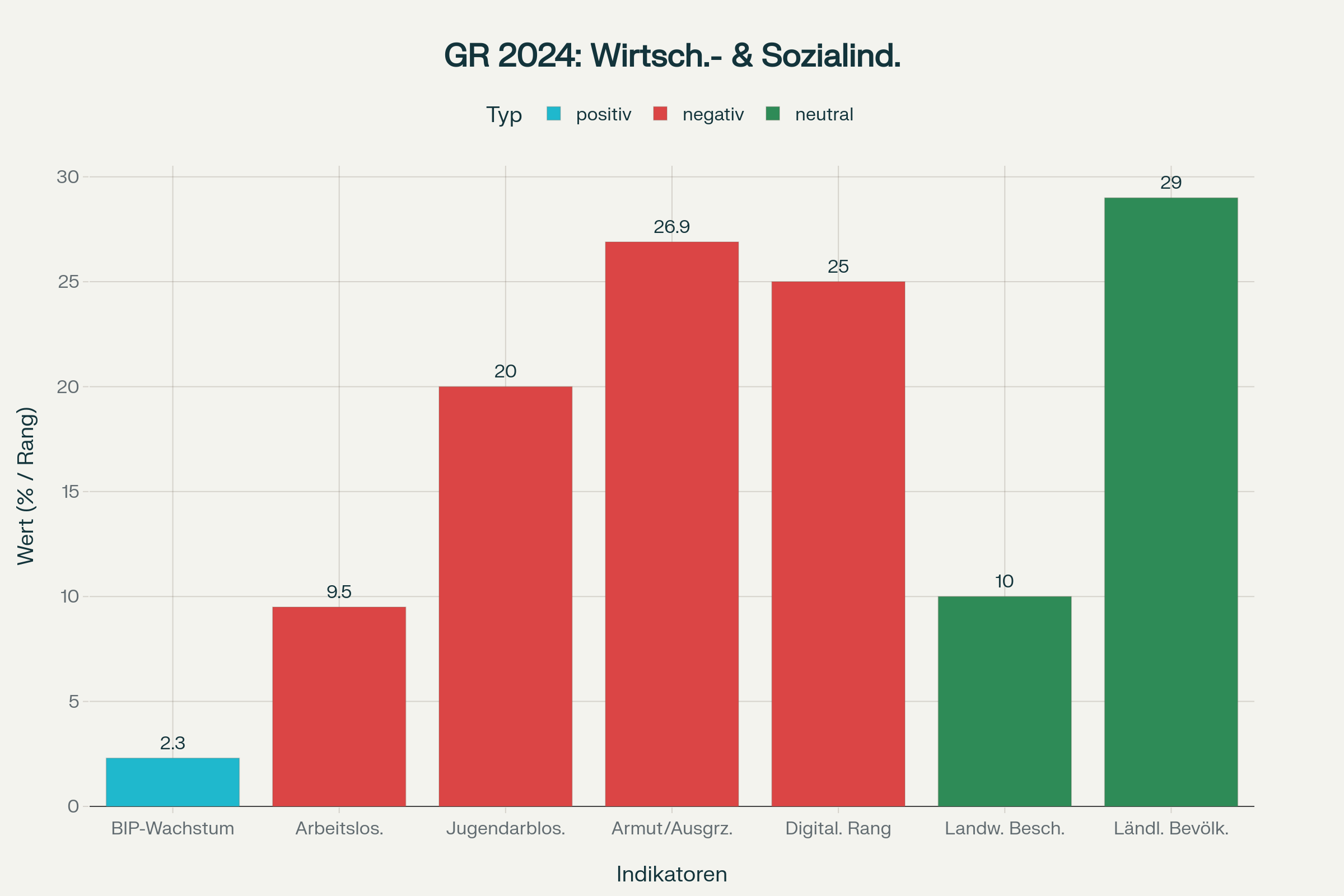
Current economic, social and political situation
Economic recovery with structural weaknesses
Greece's economy is showing signs of stabilization after the devastating crisis of the 2010s. GDP growth of 2.2% in 2024 clearly exceeds the eurozone average, and unemployment has fallen from peaks of over 25% to 9.5%. Particularly noteworthy is the development of the agri-food sector, whose exports rose from 4 billion euros (2008-2009) to 10.85 billion euros (2023) - an increase of 171%.english.news+2
However, the structural challenges remain considerable. Public debt stands at 153.6% of GDP and, despite improvements, the country continues to struggle with the second-highest unemployment rate in the EU. Youth unemployment is particularly problematic, standing at around 20% and forcing an entire generation to emigrate.economy-finance.europa+3
Fragmented political landscape
Greece's political situation is characterized by increasing fragmentation and a shift to the right. In the 2024 European elections, the ruling Nea Dimokratia lost considerable support, while far-right parties received almost 16% of the vote. This development reflects the population's growing dissatisfaction with traditional politics and a longing for alternative solutions.boell+1
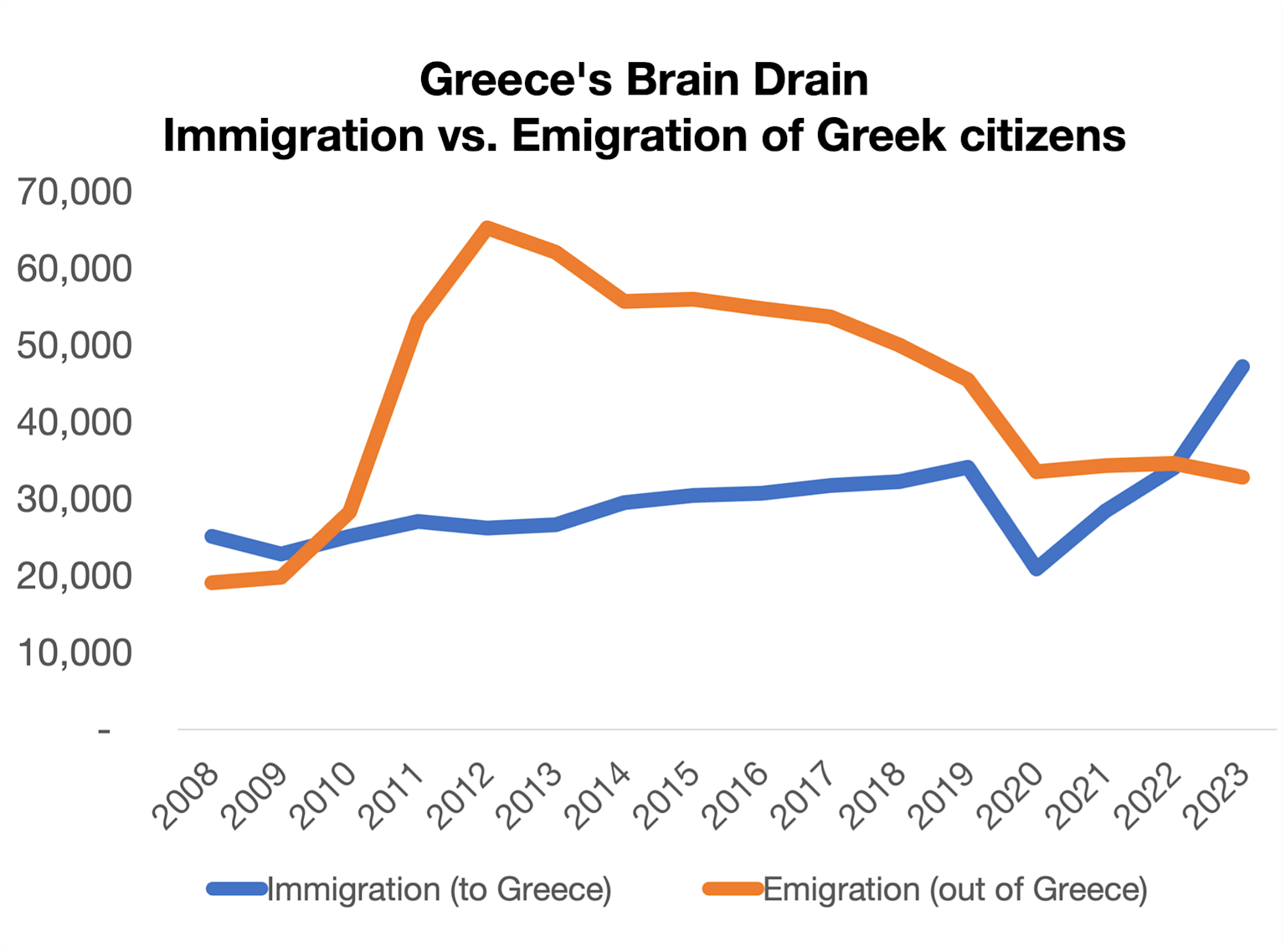
Inequality and regional disparities
Urban-rural divide widens
Inequality in Greece manifests itself particularly strongly in regional disparities. Athens has systematically higher income and consumption inequality than the rest of the country. While the capital region benefited from the economic recovery, rural areas were left behind. This further exacerbated the already existing urban-rural divide.ssoar
The islands and remote mountainous regions are particularly affected, with only 20% of the rural population using public health services as their main source, while 31.8% rely on private doctors. These disparities also extend to the education system, where rural schools perform significantly worse than urban schools.brokenchalk+1
Corporate income as the main driver of inequality
A central structural problem is the extreme inequality in corporate income. Although this only accounts for 21% of total disposable household income, it contributes to 85% of overall inequality. This points to significant problems with tax justice and the distribution of economic opportunities.eprints.lse
Brain drain and demographic challenges
Massive exodus of highly qualified workers
Greece has experienced an unprecedented exodus since the financial crisis. Between 2008 and 2013, 427,000 people left the country, mostly highly qualified professionals. Of the emigrants, 26% have a university degree and 69% have a master's or doctorate. This trend is continuing: over 100,000 people have emigrated every year since 2013.papers.ssrn+2
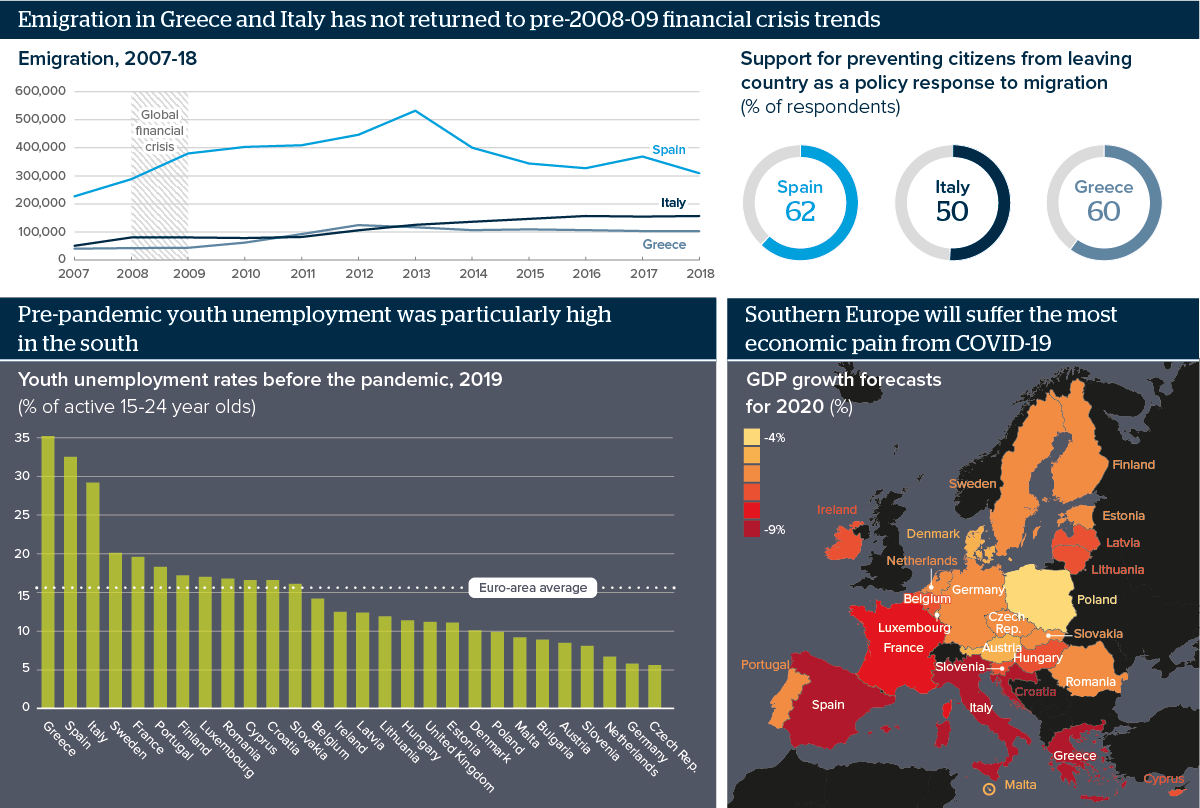
The "skills mismatch" is particularly problematic: 51.4% of engineers and 60.8% of humanities graduates do not work in their specialist field. This leads to frustration and further increases the willingness to emigrate.blogs.lse
Social consequences of emigration
The brain drain has far-reaching social consequences. Families are being separated, rural areas are becoming more depopulated and the country is losing important human resources for reconstruction. At the same time, new transnational networks are emerging that could be used to develop alternative economic models if the right framework conditions were in place.journalism.csis
Corruption, clientelism and institutional weaknesses
Deep-rooted structural problems
Corruption and clientelism have characterized the Greek political system for decades. These practices manifest themselves in discriminatory access to state resources, political influence on personnel decisions and a lack of transparency in public contracts.library.fes+1
The judicial system suffers from political influence and inefficient handling of corruption cases. Although prominent politicians have been convicted of corruption, health reasons or insufficient evidence often lead to premature dismissals.eliamep
Effects on social trust
These institutional weaknesses significantly undermine the population's trust in democratic institutions. Many Greeks see personal relationships and vitamin B as more important than performance and qualifications. This creates an environment that makes alternative, more transparent economic models attractive.journalism.csis
Cultural strengths and traditions of solidarity
Strong family and community networks
Despite the challenges, Greece has remarkable cultural strengths. The family remains the central social element, and traditional neighborhood support is particularly strong in rural areas. These solidarity structures were reactivated during the crisis as an important survival strategy.developmentofpeoples+1
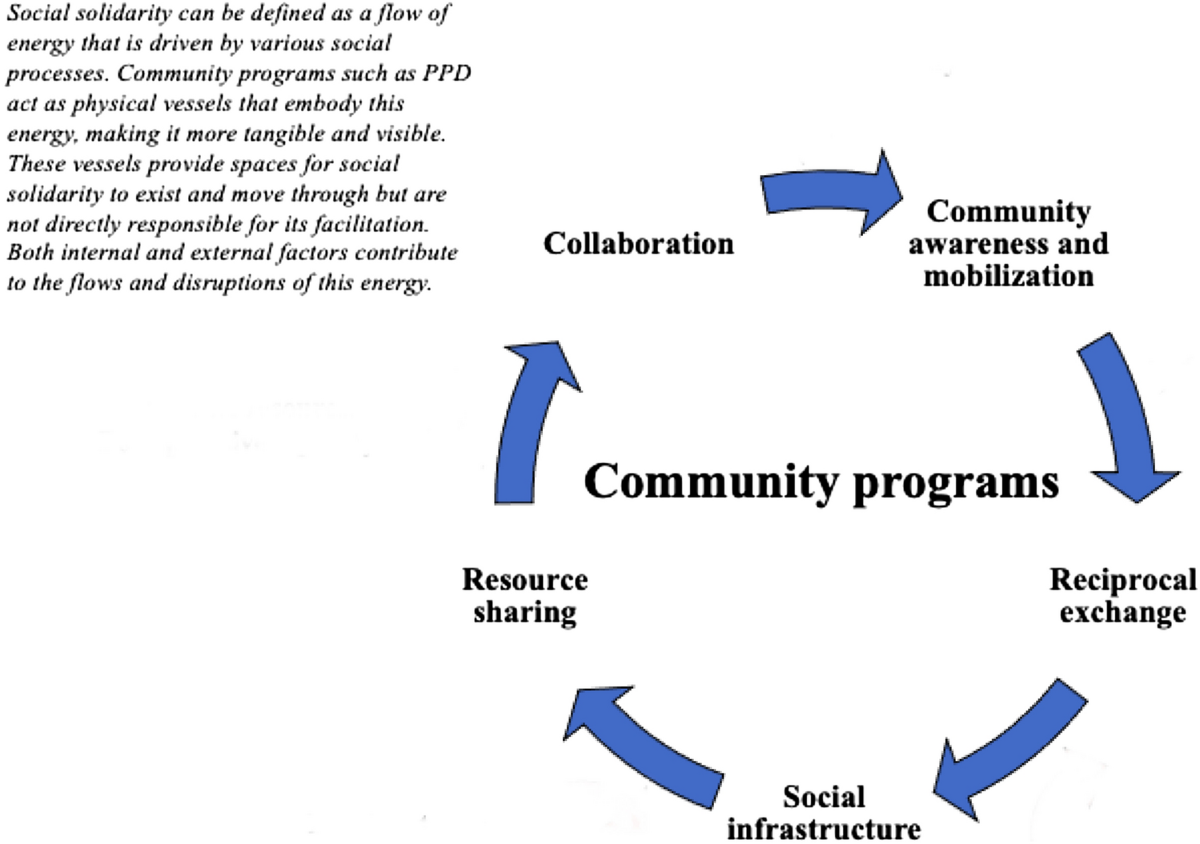
Organizations such as "Solidarity Now" demonstrate how Greek solidarity traditions support both refugees and local people in need. The "Home for Hope" program brings asylum seekers and Greek host families together and strengthens social cohesion.developmentofpeoples
Religious and cultural institutions as anchor points
The Orthodox Church and local cultural associations continue to play an important role as social links, especially in rural areas. These institutions could serve as multipliers for alternative economic models that harmonize with traditional values of solidarity and community.eric.ed
Education system between tradition and innovation
Challenges in the education sector
The Greek education system is struggling with considerable problems. In 2018, spending on education amounted to just 3.9% of GDP, one of the lowest levels in the EU. Rural schools perform significantly worse than urban schools, and the digital divide is significant: in 2018, a fifth of pupils did not have a computer for schoolwork.brokenchalk
The COVID-19 pandemic further exacerbated these inequalities. 90.6% of students had problems with distance learning, 53.1% did not have an adequate internet connection. These deficits hinder the development of digital skills, which are essential for a modern economy.brokenchalk
Innovative approaches in the periphery
Nevertheless, there are hopeful examples of innovation. The "Logomathia" programme on the island of Karpathos shows how multimedia technology can revitalize single-class schools. Such decentralized innovations could serve as a model for the implementation of digital currency systems.eric.ed
Healthcare system and care work
Massive urban-rural disparities
The Greek healthcare system is highly centralized and places rural areas at a considerable disadvantage. Only 20% of the rural population uses public healthcare services as their main source of care. Mobile health units and telemedicine projects are trying to close these gaps, but are still too limited.elefthw+2
Care work as an invisible pillar
Care work is traditionally performed by women and is little recognized by society. However, this unpaid work is systemically relevant and could be appropriately valued in a gradido system. Volunteer work and family support have become even more important during the crisis.sgi-network+1

Readiness for innovation and digital transformation
Lagging behind in digitization
Greece ranks only 25th out of 27 EU countries in the Digital Economy and Society Index (DESI). Only 39% of SMEs have basic digital skills (EU average: 55%) and only 4% use AI (EU average: 8%).eitdigital+1
Strategic realignment
Despite the backlog, the government has adopted a strategic roadmap with the "Digital Transformation Bible 2020-2025". Open innovation is becoming more important and collaboration between established companies and start-ups is increasing.eitdigital+1

This development creates a favorable environment for innovative approaches such as Gradido, which combine digital technologies with social innovations.
Alternative economic models and cooperatives
Living tradition of alternative currencies
Greece has a wealth of experience with alternative currency systems that emerged during the crisis:
The TEM system in Volos with over 800 members and the Ovolos system in Patras with 332+ members show that alternative currencies can work in Greece. Both systems operate at a ratio of 1:1 to the euro and have proven to be stable.bbc+1
Cooperative structures as a basis
Greece has a strong cooperative tradition, especially in agriculture. There are three levels: primary (local), secondary (Unions) and tertiary (Central Unions) cooperatives. Although the system is fragmented, it provides a solid basis for the implementation of alternative economic models.base.socioeco+2
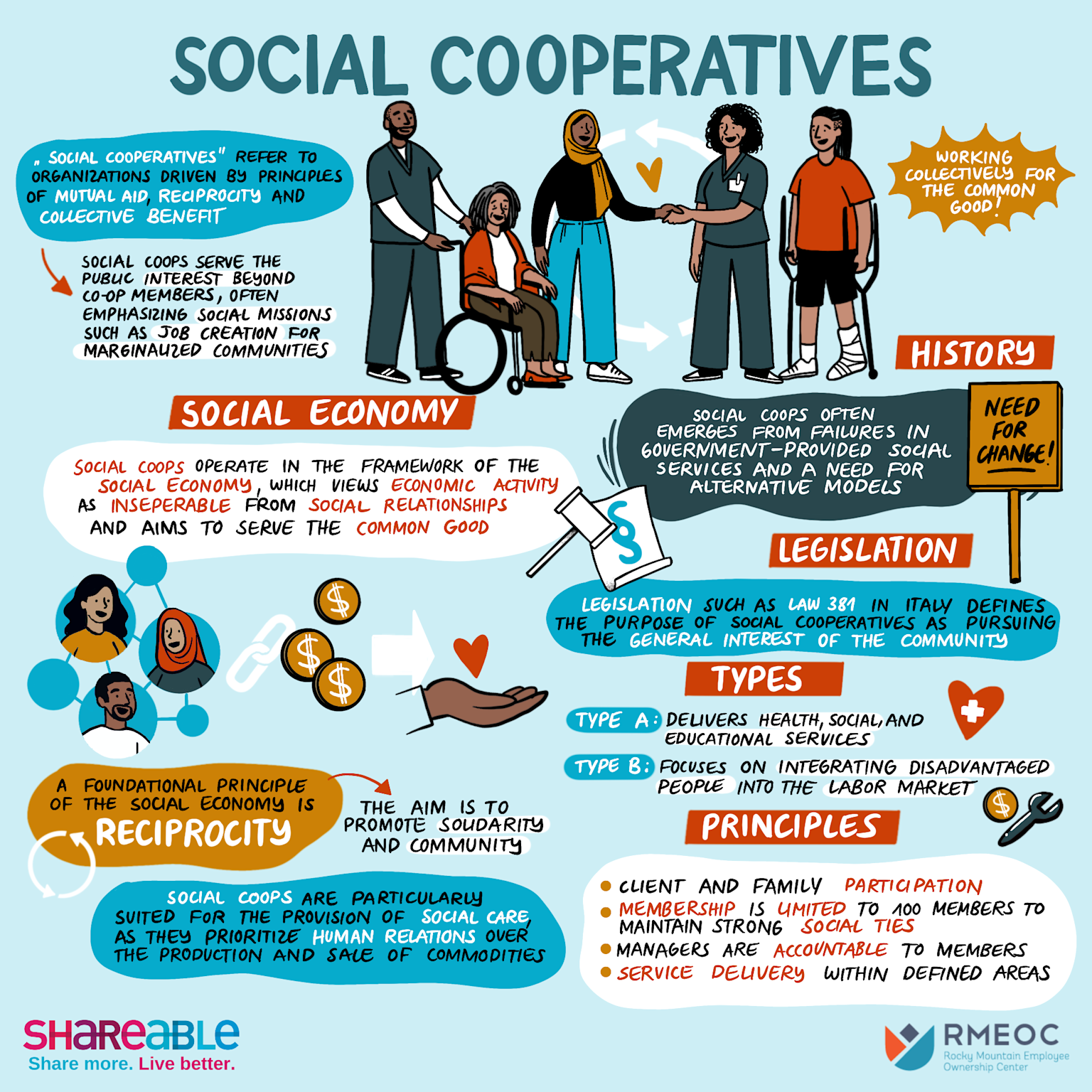
Law 4019/2011 introduced Social Cooperative Enterprises (SCEs) and created a legal framework for the social economy for the first time. This development demonstrates the country's openness to innovative forms of business.base.socioeco
Agricultural situation and food sovereignty
Small company structure with potential
Greek agriculture consists of around 700,000 farms with an average of 7 hectares - 70% are smaller than 5 hectares. This structure may be economically challenging, but it offers ideal conditions for community-based economic models.agriculture.europe+1
Over 70% of agricultural land has natural constraints (mountains, drought, islands). These conditions require innovative, resilient cultivation methods such as those practiced in permaculture.agriculture.europe
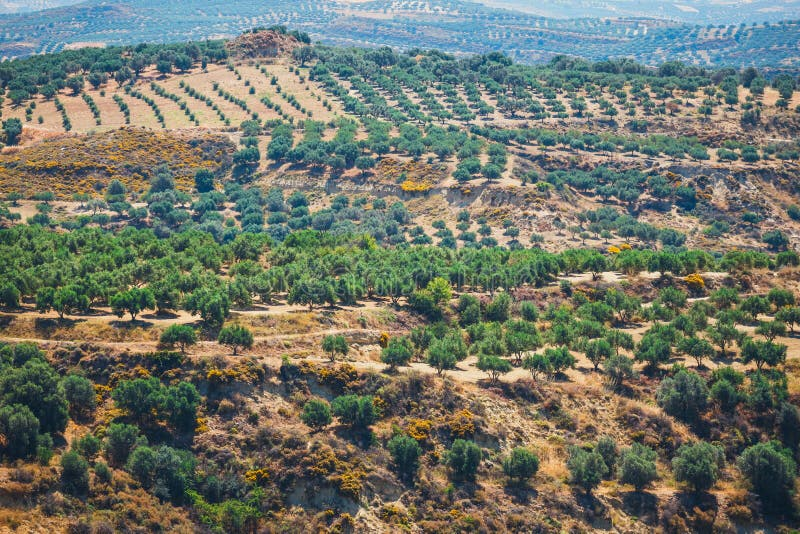
Sustainable agriculture movement is growing
Although only 10% of agricultural land is farmed organically, the movement for regenerative agriculture is growing. Projects such as Re-Green, Dio Pigadia and the Cob/αειphόria cooperative demonstrate alternative cultivation methods.ecotourism-greece+3
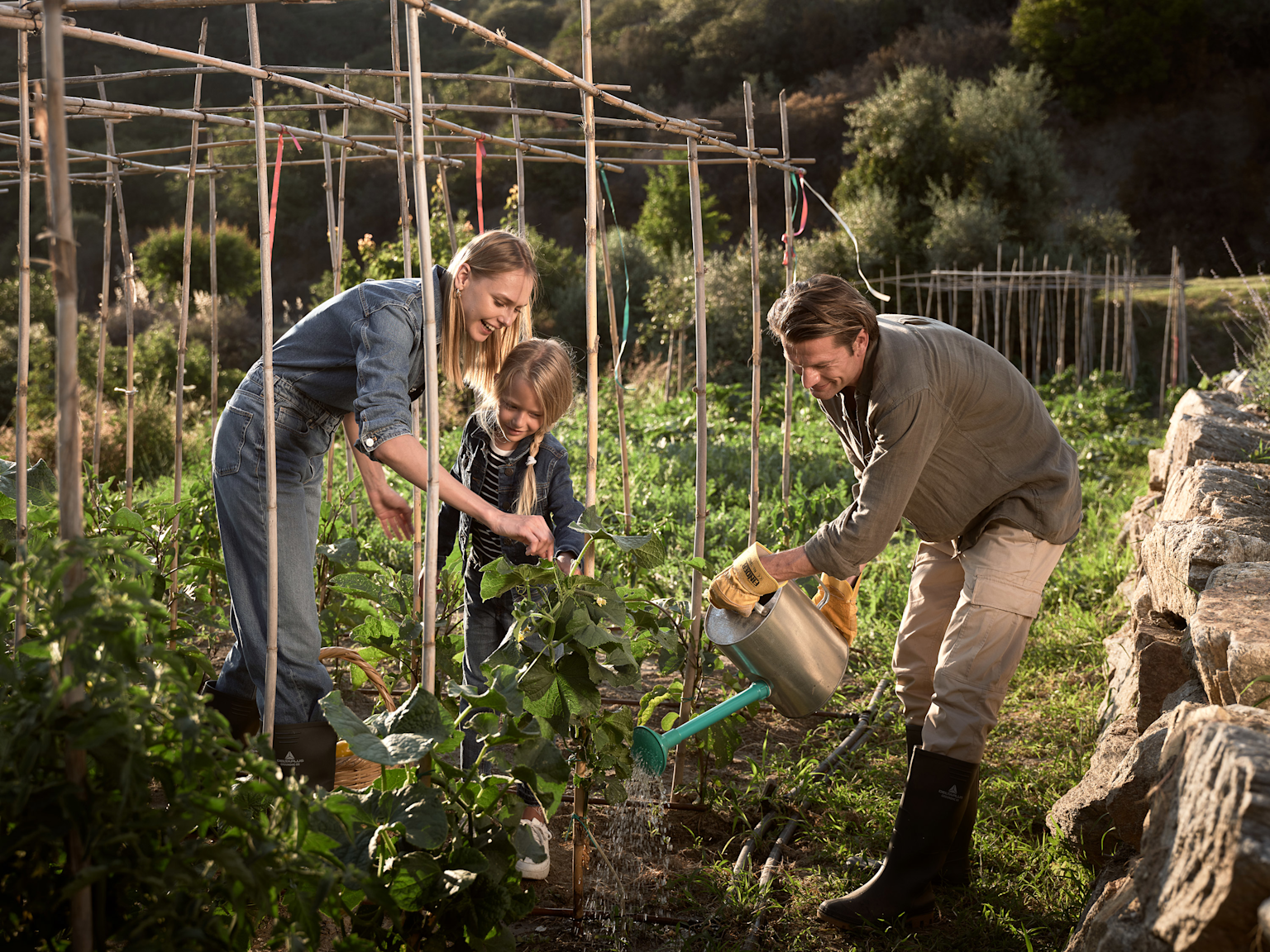
These initiatives combine permaculture with community life and show how Gradido principles could be put into practice.
International players and cooperations
EU as main financier
The EU is the most important international player in Greece. Over 2.27 billion euros were spent on migration and asylum alone between 2014-2020. The Recovery and Resilience Facility fundamentally changes EU funding and offers new opportunities for innovative projects.china-cee+1
UN organizations and NGOs
International organizations such as IOM, UNHCR and UNICEF are very active with 1.25 billion euros in EU funding. These structures could be used for the international networking of Gradido projects.home-affairs.europa
The Hellenic Platform for Development coordinates Greek NGOs and works on the UN Sustainable Development Goals. Such networks offer ideal starting points for Gradido initiatives.gcap
Potential and hurdles for Gradido
Favorable framework conditions
Several factors speak in favor of a successful introduction of Gradido in Greece:
Proven alternative currenciesTEM, Ovolos and other systems have shown that Greeks accept alternative currencies.bbc+2
Strong traditions of solidarityFamily, neighborhood and community are deeply rooted values.developmentofpeoples+1
Cooperative experience: Centuries-long tradition of cooperative economic forms.base.socioeco+1
High level of sufferingEconomic crisis and social problems create openness for alternatives.papers.ssrn
Active civil society303 organizations have signed joint declarations - the largest collective action by Greek civil society.civicus
Central challenges
At the same time, there are considerable hurdles:
Regulatory uncertaintiesAlternative currencies operate in legal gray areas.iwkoeln+1
FragmentationLocal initiatives scale poorly and remain isolated.ijccr+1
Euro pegStrong emotional and practical attachment to the euro.bbc+1
Institutional mistrustCorruption and clientelism have undermined trust.library.fes+1
Digital divideLow digitization makes technical implementation difficult.brokenchalk+1
Recommendations for Gradido pilot projects
Regional focus
Islands and remote areasThis is where the need for alternative solutions is greatest and the communities are manageable. The island of Karpathos with its multimedia experiments could be an ideal starting point.eric.ed
Agricultural cooperativesExisting structures in Thessaly or Crete could serve as a basis for integrating Gradido into established production and marketing cycles.newmedit.ciheam+1
Social target groups
Young returneesGreek emigrants who want to return bring international experience and a willingness to innovate with them.blogs.lse+1
Social economy playersExisting social cooperative enterprises are ideal starting points.base.socioeco+1
Sustainability communitiesPermaculture and eco-projects already share Gradido values.ecotourism-greece+2
Strategic partnerships
Municipal levelMayors of Volos and other cities have supported alternative currencies.bbc
Universities and research institutionsAcademic support would create credibility.
International NGOsUN agencies and EU programs could provide funding and legitimacy.home-affairs.europa+1
Conclusion: Greece as a pioneering country for Gradido
Greece offers unique conditions for the introduction of Gradido. The combination of proven alternative currencies, strong traditions of solidarity, a pronounced cooperative culture and a high level of social suffering creates a favorable environment for innovative economic models.
The challenges are considerable, but not insurmountable. A step-by-step approach that starts with existing structures and addresses local needs has a good chance of success. Greece could thus go from being a country in crisis to a pioneer of a new economy oriented towards the common good - and show the way for other European countries.
The time is ripe for Gradido in Greece. People have learned during the crisis that solidarity survives when markets fail. Now it is time to translate this insight into a sustainable future.
- https://english.news.cn/20250620/5756980b008d4a5d80d935ad41b1c391/c.html
- https://china-cee.eu/2025/01/21/greece-political-briefing-greeces-economic-recovery/
- https://economy-finance.ec.europa.eu/economic-surveillance-eu-economies/greece/economic-forecast-greece_en
- https://www.bankofgreece.gr/Publications/Note_on_the_Greek_economy_20_06_2025.pdf
- https://blogs.lse.ac.uk/greeceatlse/2021/03/10/discussing-the-brain-drain/
- https://www.dw.com/en/greece-central-bank-reports-brain-drain-of-427000-young-educated-greeks-since-2008/a-19373527
- https://eu.boell.org/en/2024/06/17/wreckage-ray-hope-greek-politics
- https://china-cee.eu/2024/09/24/greece-political-briefing-a-new-political-landscape-after-the-ep-election/
- https://www.ssoar.info/ssoar/bitstream/document/87342/1/ssoar-regionersa-2023-1-psycharis_et_al-The_geographical_dimension_of_income.pdf
- https://brokenchalk.org/educational-challenges-in-greece-managing-education-after-two-crises/
- https://www.rrh.org.au/journal/article/1661/
- http://eprints.lse.ac.uk/6594/1/Inequality_in_Greece_An_Analysis_by_Income_Source.pdf
- https://papers.ssrn.com/sol3/papers.cfm?abstract_id=4169615
- https://journalism.csis.org/enabling-entrepreneurship-diplomatic-responses-to-greeces-brain-drain/
- https://library.fes.de/pdf-files/bueros/athen/15078.pdf
- https://www.eliamep.gr/wp-content/uploads/2020/12/Policy-Paper-46-Sotiropoulos-final.pdf
- https://developmentofpeoples.org/en/get-informed/insights/download/74/520/39?method=view
- https://www.alternatives-humanitaires.org/en/2016/11/23/greece-is-an-example-of-solidarity-for-europe/
- https://files.eric.ed.gov/fulltext/ED410074.pdf
- http://www.elefthw.gr/pdf-195817-116476?filename=116476.pdf
- https://ruralneuropractice.com/mental-healthcare-delivery-in-rural-greece-a-10-year-account-of-a-mobile-mental-health-unit/
- https://www.sgi-network.org/2024/Greece/Social_Sustainability
- https://www.eitdigital.eu/fileadmin/2024/publications/Foundation-Digital-Transformation-in-Greece-report-2023-2024.pdf
- https://innovation-entrepreneurship.springeropen.com/articles/10.1186/s13731-025-00509-5
- https://www.oecd.org/content/dam/oecd/en/publications/reports/2022/12/digital-transformation-projects-in-greece-s-public-sector_79baae80/33792fae-en.pdf
- https://www.bbc.com/news/world-europe-17680904
- https://ijccr.net/wp-content/uploads/2012/05/ijccr-2011-special-issue-06-sotiropoulou.pdf
- https://base.socioeco.org/docs/nasioulas_-_social_cooperatives_in_greece.pdf
- http://newmedit.ciheam.org/share/img_new_medit_articoli/74_38sergaki.pdf
- https://edepot.wur.nl/244798
- https://agriculture.ec.europa.eu/system/files/2024-01/csp-at-a-glance-greece_en.pdf
- https://agriculture.ec.europa.eu/cap-my-country/cap-strategic-plans/greece_en
- https://ecotourism-greece.com/tour/permaculture-or-organic-farming-workshops/
- https://forum-synergies.eu/bdf_fiche-experience-227_en.html
- https://foodtank.com/news/2023/05/growth-of-regenerative-farming-in-greece/
- https://www.slowtravelgreece.com/natural-building-bioclimatic-architecture-by-cob-social-cooperative/
- https://home-affairs.ec.europa.eu/policies/migration-and-asylum/migration-management/migration-management-greece/financial-support-eu_en
- https://gcap.global/es/coalition/greece/
- https://rapidtransition.org/stories/new-money-meets-the-cost-of-change-how-local-currencies-save-economies-and-communities-and-help-them-flourish/
- https://www.civicus.org/index.php/media-resources/news/interviews/5693-greece-together-we-can-do-more
- https://www.iwkoeln.de/presse/in-den-medien/juergen-matthes-neither-grexit-nor-a-dual-currency-will-solve-greeces-problems.html
- https://cepr.org/voxeu/columns/parallel-currency-greece-part-i
- https://knowledgehub.unsse.org/wp-content/uploads/2023/08/Eleni-et-al.pdf
- https://www.ceps.eu/ceps-publications/euro-foreign-currency-greece/
- https://knowledgehub.unsse.org/wp-content/uploads/2019/06/133_Geormas_Greek-Social-Cooperative-Enterprises_En.pdf
- https://www.sgi-network.org/2024/Greece/Key_Challenges
- https://ifs.org.uk/sites/default/files/2024-12/Fiscal%20Studies%20-%202024%20-%20Danchev%20-%20Equally%20poorer%20%20inequality%20and%20the%20Greek%20debt%20crisis.pdf
- https://www.statistics.gr/documents/20181/042d41d4-d995-48e4-5bf3-50d7d320acef
- https://www.rosalux.de/en/news/id/52110/greeces-uncertain-return-to-a-fragile-normalcy
- https://ejournals.epublishing.ekt.gr/index.php/scad/article/view/32222
- https://www.oecd.org/en/publications/oecd-economic-outlook-volume-2025-issue-1_83363382-en/full-report/greece_aff2d9d0.html
- https://economy-finance.ec.europa.eu/document/download/ca50fb99-491f-449b-96c2-6904e2efa8fc_en?filename=ip299_en.pdf
- https://globalallianceagainsthungerandpoverty.org/wp-content/uploads/2024/11/Greece-SoC-Approved.pdf
- https://en.wikipedia.org/wiki/Economy_of_Greece
- https://www.hrw.org/world-report/2024/country-chapters/greece
- https://ec.europa.eu/eurostat/web/products-eurostat-news/w/ddn-20250430-2
- https://tradingeconomics.com/greece/full-year-gdp-growth
- https://freedomhouse.org/country/greece/freedom-world/2024
- https://gateway.euro.who.int/en/hfa-explorer/gini-coefficient/greece/
- https://www.uni-konstanz.de/crimeandculture/docs/Discussion_Paper_No_23_Greece_November_2008.pdf
- https://www.sciencedirect.com/science/article/abs/pii/S1703494923000191
- https://link.springer.com/chapter/10.1007/978-3-031-11574-5_2
- https://d-nb.info/1079846638/34
- https://ec.europa.eu/eurostat/statistics-explained/index.php?title=Urban-rural_Europe_-_income_and_living_conditions
- https://jehd.thebrpi.org/journals/jehd/Vol_3_No_4_December_2014/21.pdf
- https://www.lse.ac.uk/Hellenic-Observatory/Assets/Documents/Publications/Past-Discussion-Papers/DiscussPaper8.pdf
- https://www.ejpp.eu/index.php/ejpp/article/view/366
- https://www.qeios.com/read/XMF3J9
- https://ej-social.org/index.php/ejsocial/article/view/387
- https://www.boeckler.de/pdf/p_imk_study_38_2015.pdf
- https://en.wikipedia.org/wiki/Education_in_Greece
- https://old-2014-2020.greece-bulgaria.eu/approved-project/5/
- https://national-policies.eacea.ec.europa.eu/youthwiki/chapters/greece/84-promoting-culture-and-cultural-participation
- https://education.ec.europa.eu/sites/default/files/document-library-docs/et-monitor-report-2019-greece_en.pdf
- https://link.springer.com/article/10.1057/s41269-020-00154-8
- https://www.oecd.org/content/dam/oecd/en/publications/reports/2018/04/education-for-a-bright-future-in-greece_g1g8d233/9789264298750-en.pdf
- https://pmc.ncbi.nlm.nih.gov/articles/PMC10397111/
- https://wseas.com/journals/articles.php?id=321
- https://boehringer-ingelheim.com/about-us/sustainable-development/sustainability-hub/island-healthcare/
- https://www.sciencedirect.com/science/article/abs/pii/S074081880400026X
- https://health.ec.europa.eu/system/files/2019-11/2019_chp_gr_english_0.pdf
- https://aead.gr/images/manuals/EN/FINAL_8.1.2-education-for-integrity-greece-EN.pdf
- https://geo.coop/story/alternative-economies-community-currencies
- https://www.helidonifoundation.org/programs/points-of-support-2
- https://www.eliamep.gr/en/projects/dimiourgia-diktyou-organoseon-kai-omadon-tis-koinonias-politon-sto-plaisio-ton-stochon-tis-viosimis-anaptyxis-tou-oie/
- https://iobe.gr/docs/research/res_03_10062015_rep_eng.pdf
- https://www.files.ethz.ch/isn/187235/POLICY-PAPER-No26.2015_-Ioannis-Nasioulas.pdf
- https://www.bodossaki.gr/en/our-initiatives/1821-greek-revolution/action-plan-for-civil-society-in-greece/
- https://www.bankofgreece.gr/Publications/4920190705_en.pdf
- https://www.cicopa.coop/wp-content/uploads/2018/03/Promoting_cooperatives_and_the_social_economy_in_Greece_Sep_2013.pdf
- https://eeagrants.org/archive/2014-2021/projects/GR-ACTIVECITIZENS-0091
- https://www.rgs.org/in-the-field/grants/projects-supported/grant-stories/the-right-to-energy-justice-in-post-crisis-greece/
- https://library.fes.de/pdf-files/bueros/athen/20291.pdf
- https://www.resilience.org/stories/2017-12-13/greece-alternative-economies-community-currencies-pt-3-faircoop/
- https://www.sciencedirect.com/science/article/pii/S0016328724001630
- https://ec.europa.eu/social/BlobServlet?docId=21741&langId=en
- https://www.minagric.gr/en/
- https://ceur-ws.org/Vol-3293/paper4.pdf
- https://www.alpha.gr/-/media/AlphaGr/Files/Group/Agores/Sectors-in-Focus/Sectors-in-focus_Agriculture_December-2024.pdf
- https://dio-pigadia.com
- https://www.c-gaia.gr/en/product/producer-organisations-in-greek-agriculture/
- https://www.eliamep.gr/en/the-cap-between-a-rock-and-a-hard-place-its-new-challenges-and-uncertain-prospects/
- https://hacg.gr/?lang=en
- https://journals.bilpubgroup.com/index.php/jees/article/view/8363
- https://kamarantho.gr/en/about-us/
- https://www.c-gaia.gr/en/network/
- https://www.c-gaia.gr/en/recent-advances-in-the-greek-and-european-farming-coopincap-information-shot-10/
- https://www.arc2020.eu/permaculture-green-solutions-in-the-greek-countryside/
- https://www.fundsforngos.org/bilateral-funds-for-ngos/hellenic-aid/
- https://www.oecd.org/en/publications/development-co-operation-profiles_04b376d7-en/greece_35e05afc-en.html
- https://core.ac.uk/download/pdf/301373731.pdf
- https://base.socioeco.org/docs/34.pdf
- https://www.developmentaid.org/organizations/view/134979/eyropaiko-institoyto-topikhs-anaptykshs-european-institute-for-local-development
- https://www.bankofgreece.gr/en/news-and-media/press-office/news-list/news?announcement=6b0b3fd6-faf6-474b-88a3-06f75b40e0dc
- https://unicornriot.ninja/2017/greece-alternative-economies-community-currencies-part-one-athens-integral/
- https://www.developmentaid.org/organizations/view/69658/hellenic-platform-for-development
- https://www.oecd.org/content/dam/oecd/en/publications/reports/2024/01/financial-literacy-in-greece-evidence-on-adults-and-young-people_b0774415/07e4fbd9-en.pdf
- https://hellenicaid.mfa.gr/en/hellenic-aid/
- https://eur-lex.europa.eu/legal-content/EN/TXT/?uri=legissum%3Al25059
- https://ppl-ai-code-interpreter-files.s3.amazonaws.com/web/direct-files/33f6eeea226a4945acb36813e7b12036/7735aa9f-d837-485e-b1b3-df3bf2dd0ba0/ad239432.csv
